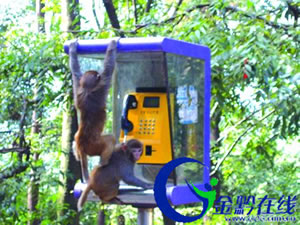| Home / English Column / Environment / Environment -- What's New | Tools: Save | Print | E-mail | Most Read |
| Monkey Business by Sex-starved Chimps in Park |
| Adjust font size: |
Rhesus monkeys, especially sex-starved males, are making trouble and attacking people in a wildlife park in Guizhou Province. Some citizens say they should be given contraceptives.
There are far more males than females at the park in southwest China and the extra "lonely heart" males become aggressive, attacking people. The number of injuries from monkey attacks is increasing, and the primates also have destroyed vegetation and damaged the park's bio-system. "The park authorities should give the monkeys contraceptive medicine to keep them from reproducing too fast," said Aunti Ren, an animal lover who feeds monkeys every day at Qianling Park in the provincial capital of Guiyang. The 426-hectare park is experiencing a baby boom of rhesus monkeys. The population has topped 500, compared with 40 in the 1980s, said Bi Jianming, a park official. Park authorities are soliciting advice from citizens and experts on how to manage the unruly animals. Seventy-two tourists were assaulted by rhesus monkeys at the park in 2003, and park authorities had to pay more than 12,500 yuan (US$1,562) in medical costs. In 2004, 253 people were injured, costing the park 40,000 yuan. In 2005, 505 people were hurt by the monkeys, resulting in 84,000 yuan in medical expanses. Professor Luo Rong at Guizhou Normal University said the ideal park population is 150 and the ideal sex ratio is two and a half females to one male. But there are not enough female monkeys at the park to match the males and these extra, unloved males become aggressive. They attack humans and fight among themselves, said Luo. They live on wild fruit on Qianling Mountain for only five months of the year and for the remaining seven months, they rely on zookeepers and tourists to feed them. Each year, several million tourists flock to Qianling Park to watch the rhesus monkeys. "It's probably the only place in China where you can stay so close to wild monkeys at an urban park," said Liang Yi, a Beijinger who visits the monkeys on every trip to Guizhou. (Xinhua News Agency March 15, 2006)
|
| Tools: Save | Print | E-mail | Most Read |
 |
| Related Stories |
